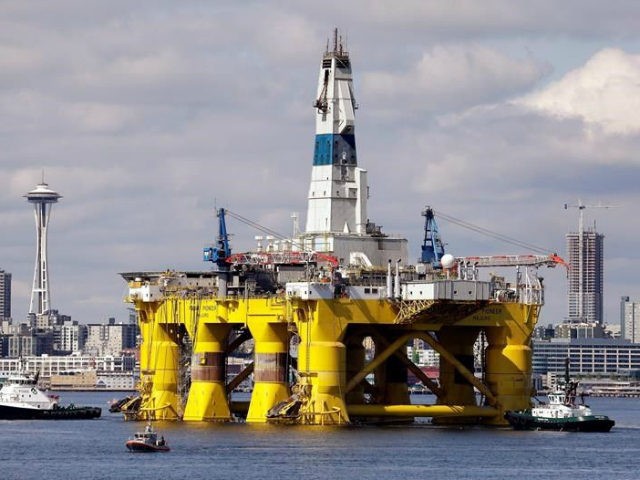Chris Warren, vice president of the Institute for Energy Research, discussed President Obama’s ban on Arctic oil drilling with SiriusXM host Raheem Kassam on Thursday’s Breitbart News Daily.
“What the President did was use a 1953 law called the Outer Continental Shelf Lands Act, and he took a really obscure part of that law, which says from time to time, the president can withdraw lands that are currently unleased from future leasing for oil and gas production, basically,” Warren explained.
“This has been used from time to time in the past, but very sparingly. What the President has done is applied that law to basically everything offshore – Arctic, everything offshore Atlantic, or at least most areas on the offshore United States. He’s basically saying, ‘We’re going to prevent any future drilling for oil and gas in these offshore areas,’ which are extremely energy-rich areas,” he continued.
He said this was done because “this President wants to keep these resources in the ground.”
“He has been beholden to keep-it-in-the-ground activists his entire presidency. These are people who believe that we need to keep our oil, gas, and coal resources in the ground, but the end result of that is higher energy costs. That’s been the goal of this President’s entire climate and energy agenda,” Warren said.
Kassam said Obama’s move “feels like a backlash, like he’s doing this out of petulance, perhaps towards the incoming President’s approach to anthropogenic global warming or what have you.”
Warren thought it was a combination of Obama’s longterm plans, plus a “knee-jerk reaction” to the 2016 election.
“The President, I’m sure, believed that he was going to be able to pass off his climate legacy to President Hillary Clinton, and that they would continue down this path, to lock the United States into these terrible policies,” he said. “I think he was shocked to see the incoming President, President-elect Trump, doesn’t subscribe to his worldview on these issues, and that he wants to use our oil, gas, and coal resources to the benefit of the American people. I think the President is lashing out in reaction.”
Warren worried about the higher energy costs resulting from Obama’s policies, as has already occurred in the United Kingdom and across Europe.
“The President has followed the European blueprint, which has failed Europe, and I think his climate legacy will be seen ultimately as a failure,” he said. “Some of those reasons would be the Trump administration will undo it, and other reasons would be it won’t achieve the goals he wants, and it will ultimately leave people with higher energy costs.”
He maintained it was not dangerous to drill in the areas Obama has banned.
“Especially if you’re talking about the Arctic, a lot of folks on the environmental Left like to point to the incident with BP in the Gulf of Mexico. But if you’re looking at the Arctic compared to the Gulf of Mexico, we’re talking about drilling in 150 feet of water in the Arctic compared to thousands and thousands of feet in the Gulf,” Warren pointed out. “Plus, technology and safety precautions have come a long way in recent years. It’s very safe. The people in the oil and gas industry are experts. They know what they’re doing. It’s a safe way to power our country, to provide energy for the people who need it.”
“There isn’t a replacement out there,” he added. “I know the current President likes to point to renewables, but there’s nothing out there that can really replace our need for oil.”
Kassam asked Warren about the contention that President Trump cannot easily lift Obama’s ban because it was accomplished through the interpretation of a longstanding law, rather than a mere executive order.
“We’re really in uncharted territory here because no president has ever used this law for this large of an area, for this purpose, and no president has challenged it yet,” Warren replied. “I think what the Trump administration can do is try to un-designate these areas, and they’ll obviously be sued, by environmental groups especially. This will go to the courts, and the courts will ultimately decide.”
“It’s very rare that a sitting president can bind a future president without congressional approval,” he noted. “I don’t think under this law President Obama is necessarily on firm ground. Another option here is Congress can pass legislation, and ultimately in the long run, that’s probably the best outcome we can hope for because that would put it in law, and there wouldn’t be any debate about that.”
“Now, I saw a report today from the Atlantic compare this to the Antiquities Act, where the president can designate areas, and President Obama has done this to huge areas across the United States; they can designate them as national monuments,” Warren said.
“The next president can’t necessarily come in and un-designate those areas. But what we’ve seen in the past is presidents shrink the size of those national monuments, to the point where they don’t interfere with other uses of those public lands. That’s a different law, but the precedent is there, so that might be another option for the Trump administration,” he suggested.
Breitbart News Daily airs on SiriusXM Patriot 125 weekdays from 6:00 a.m. to 9:00 a.m. Eastern.
LISTEN:

COMMENTS
Please let us know if you're having issues with commenting.